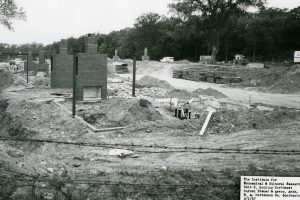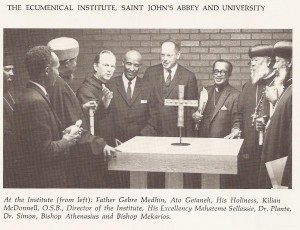 This year marks the 50th anniversary of the Collegeville Institute. On April 29, 1967, at 10:45 in the morning, the Articles of Incorporation for the Institute for Ecumenical and Cultural Research, as it was originally called, were filed with the State of Minnesota. According to those articles, the Institute would work to “dispel religious ignorance and promote better understanding and harmony” across faith traditions.
This year marks the 50th anniversary of the Collegeville Institute. On April 29, 1967, at 10:45 in the morning, the Articles of Incorporation for the Institute for Ecumenical and Cultural Research, as it was originally called, were filed with the State of Minnesota. According to those articles, the Institute would work to “dispel religious ignorance and promote better understanding and harmony” across faith traditions.
Eleven monks of Saint John’s Abbey signed the document, including the then Abbot, Baldwin Dworschak, Father Kilian McDonnell (more on him in a moment), and the innovative president of Saint John’s University, Father Colman Barry. Father Colman, among other things, played an instrumental role in creating Minnesota Public Radio, an early home to an obscure radio personality, Garrison Keillor. His drive-time show “A Prairie Home Entertainment” was broadcast from studios at Saint John’s, before it moved on to a new name and bigger things down the road in Saint Paul. Creativity has always been in the air and water at Saint John’s, and the Collegeville Institute is yet one more child of the holy imagination of this remarkable religious community.The Collegeville Institute is yet one more child of the holy imagination of this remarkable religious community.
The list of the originating Board of Directors of the Institute for Ecumenical and Cultural Research reads like a who’s who of theologians and religious leaders of the time, including Presbyterian theologian Robert McAfee Brown, Episcopal priest and scholar of Early Christianity Robert M. Grant, Baptist theologian James W. McClendon, Orthodox theologian John Meyendorff, Lutheran historian Jaroslav Pelikan, Congregationalist minister and historian Horton Davies, and the stated clerk of the United Presbyterian Church in the U.S.A., William P. Thompson.

This photo from 1967 shows the construction of the Collegeville Institute buildings, which was generously funded by philanthropists Patrick and Aimee Butler.
Three individuals present at the beginning deserve special mention: without them the Collegeville Institute would not have come to be. Philanthropists Patrick Butler and his wife Aimee provided the funds for the construction of the Collegeville Institute’s facilities. Its Butler Center is dedicated to their memory. The other is the Collegeville Institute’s founder and guiding light, Father Kilian McDonnell, OSB, theologian, ecumenist, poet, monk. In many ways the Collegeville Institute mirrors Father Kilian’s life’s work. At age 95 Father Kilian is still contributing to, and enjoying, the life of the Collegeville Institute.
Nearly five decades have passed since that Friday morning in 1967. For a bit of historical perspective, consider that 50 years ago the Presbyterian Church (U.S.A.) did not exist; the Evangelical Lutheran Church in America did not exist; and the ordination of Barbara Harris as the first woman Anglican Bishop was still over 20 years away. History happens—in our time with the speed of light over fiber-optic cables—and organizations must respond and develop in the context of that high-speed change without losing their identity. To paraphrase Jaroslav Pelikan, healthy development keeps any tradition (and institution) both from mutating into something quite different, and from hardening into a fossil.Healthy development keeps any tradition both from mutating into something quite different, and from hardening into a fossil.
The Institute has changed in many ways since 1967—even our name, with the addition of the place referent “Collegeville.” Yet in continuity with its roots in the twentieth-century’s Ecumenical Movement, the Collegeville Institute continues the work of dispelling religious ignorance and promoting better understanding and harmony by, in all of its programs, exploring faith, igniting imagination, and renewing community.
 A 50th anniversary is cause for celebration, and we’ll be celebrating the Collegeville Institute’s founding throughout the year in many ways, including guest appearances by former resident scholars
A 50th anniversary is cause for celebration, and we’ll be celebrating the Collegeville Institute’s founding throughout the year in many ways, including guest appearances by former resident scholars
- Kathleen Norris, author of many books, including The Cloister Walk, which reflects her time at Saint John’s Abbey, and
- Dr. Olav Tveit, Lutheran Theologian and current general secretary of the World Council of Churches.
The Collegeville Institute will also partner with the Theater Department of the College of Saint Benedict/Saint John’s University in staging a production of the historic play about religious toleration, Nathan the Wise, by Gotthold Ephraim Lessing, which speaks to our day with no less impact than it did when it was first published in 1779. (The Roman Catholic Church of the time considered the play—which views Islam, Judaism, and Christianity without discrimination—to be a scandal to the faith and forbade its performance.)
 Our 50th Anniversary website will soon show dates and times of these, and other events. We will also feature articles from our archives, and highlight profiles of persons closely associated with Collegeville Institute’s history—that great cloud of witnesses who has accompanied us since 1967, and will journey with us into the future. We invite you to share a memory here or on social media using the #CI50 hashtag.
Our 50th Anniversary website will soon show dates and times of these, and other events. We will also feature articles from our archives, and highlight profiles of persons closely associated with Collegeville Institute’s history—that great cloud of witnesses who has accompanied us since 1967, and will journey with us into the future. We invite you to share a memory here or on social media using the #CI50 hashtag.
Join us in celebrating the work of a singular institution that has been given the great gift of pursuing its ecumenical mission for 50 years “so that,” as the Rule of St. Benedict counsels with the writer of I Peter, “in all things God may be glorified.”
Like this post? Subscribe to have new posts sent to you by email the same day they are posted.



Leave a Reply